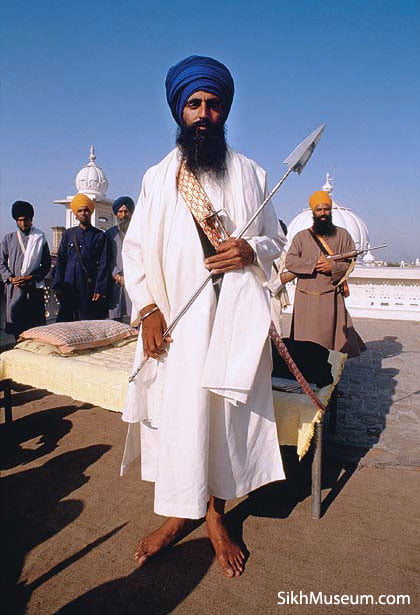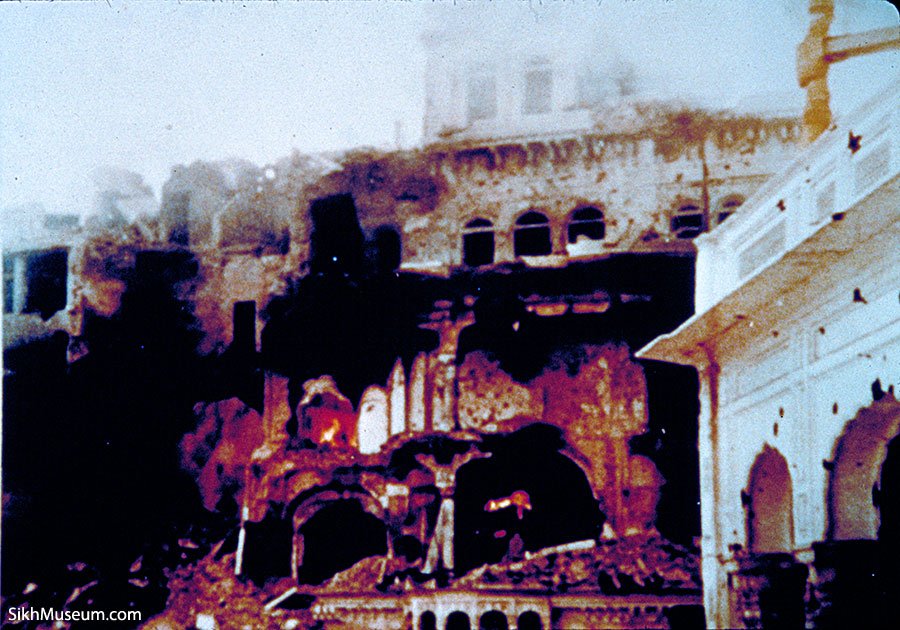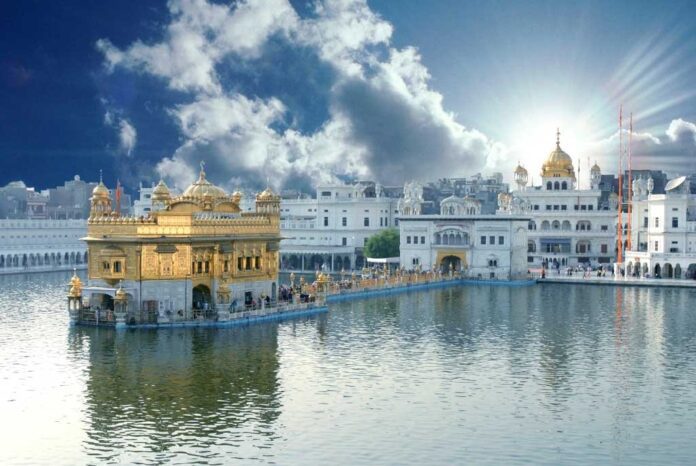Background of Operation Blue Star
Operation Blue Star was a military operation carried out by the Indian government in June 1984 to remove Sikh militants who were allegedly amassing weapons in the Golden Temple in Amritsar. The operation was ordered by then Prime Minister Indira Gandhi and aimed to dislodge Sant Jarnail Singh Bhindranwale and his followers from the temple complex.
Historical Grievances and Early Proposals for a Sikh State
The roots of the conflict can be traced back to historical grievances. The betrayal felt by the Sikhs dates back to promises made by Indian leaders like Jawaharlal Nehru before independence, which were not fulfilled post-independence. In 1946, Nehru acknowledged the special status of Sikhs but later dismissed their demands for a separate state, by simply saying that “the Sikhs have missed the bus.”
Interestingly, there were early propositions for a Sikh state. In 1940, Dr V.S. Bhatti first proposed the idea of ‘Khalistan’. In 1944, the British government considered appointing a committee to explore the creation of an independent Sikh state. These historical contexts underscore the deep-seated aspirations and subsequent disappointments of the Sikh community.
The Legacy of Maharaja Ranjit Singh and the Sikh Empire
Before delving into the mid-20th-century political movements, it is essential to recognise the historical foundation of Sikh sovereignty that significantly shaped these aspirations. The emergence of the Sikh Empire can be traced back to the early 18th century, following the death of Aurangzeb in 1707 and the subsequent decline of the Mughal Empire. During this period, the Sikh army, known as the Dal Khalsa—a reorganisation of the Khalsa inaugurated by Guru Gobind Singh—began to assert its power by leading expeditions against the weakened Mughals and the Afghans.
This phase of expansion and military engagement facilitated the growth of the Sikh forces, which eventually organised into a number of semi-independent confederacies or misls. Each misl controlled different territories, marking a period of decentralised power from 1762 to 1799. It was during this time that Sikh commanders started to emerge as significant regional powers.
Maharaja Ranjit Singh, who ascended to power in 1801, unified these disparate misls to establish a consolidated Sikh Empire with Lahore as its capital. His reign was distinguished by secular governance and military prowess, expanding the empire to include strategic territories such as Kashmir, Tibet and parts of the Northwest Frontier (now Pakistan and areas of Afghanistan).
Ranjit Singh’s administration was noted for its inclusivity, employing individuals from diverse religious backgrounds and focusing on the welfare of all his subjects, irrespective of their faith. Under his rule, the Sikh Empire saw significant advancements in administration, culture, and military organisation, which left a lasting impact on the region’s identity and aspirations.
The decline of this empire after Ranjit Singh’s death in 1839 and subsequent annexation by the British in 1849 set the stage for the complex interactions between the Sikh community and the Indian state post-independence.
Annexation by the British and Contributions During World Wars
Following the annexation of the Sikh Empire by the British in 1849, the Sikhs found themselves under colonial rule. Despite the loss of their sovereignty, the Sikh community played a significant role in supporting the British during both World War I and World War II. Their contributions were not only substantial in terms of manpower but also in their spirit of loyalty and sacrifice. Over 83,000 Sikh soldiers laid down their lives and more than 109,000 were wounded during these wars for the cause of peace and freedom.
The Sikhs fought on various fronts across Europe, Africa, and Asia, demonstrating remarkable bravery and earning numerous awards for their valour. The expectation that their considerable contributions would be recognised with political concessions, including the possibility of autonomy or an independent state, was a significant motivator. These hopes were fuelled by promises and implications made by British leaders during the war efforts.
However, the post-war period did not see the fulfilment of these expectations, leading to disillusionment and strengthening the calls for greater autonomy within India. This period highlighted the complex dynamics of colonial promises and the nationalistic aspirations of colonised peoples.
Understanding this historical backdrop is crucial as it informs the community’s persistent grievances and the profound sense of historical injustice that was exacerbated by events like Operation Blue Star.
The Punjabi Suba Movement and Continued Discontent
The Punjabi Suba movement in the 1950s and 1960s, which demanded a separate Punjabi-speaking state, further fuelled Sikh discontent. Despite concessions, such as the creation of the Punjab state in 1966, the central government’s inconsistent policies and heavy-handed approach continued to alienate the Sikh populace.
Events Leading Up to the Operation

By the late 1970s and early 1980s, tensions had escalated significantly. Sant Jarnail Singh Bhindranwale emerged as a prominent leader advocating for Sikh rights and justice. Bhindranwale was the fourteenth Jathedar, or leader, of the Damdami Taksal, a prestigious Sikh religious institution established by the Tenth Sikh Guru to preserve and promote Sikh teachings. The Anandpur Sahib Resolution of 1973, which outlined Sikh political and religious demands, was depicted by Indira Gandhi as secessionist, further straining relations.
In 1982, after failed negotiations with Indira Gandhi, the Akali Dal launched the Dharam Yudh Morcha, a series of protests and civil disobedience campaigns. This period also saw increasing violence and retaliatory attacks between militants and the state, culminating in the murder of prominent leaders and police repression.
Sant Jarnail Singh Bhindranwale being a religious leader of the Damdami Taksal had responsibility to look after Sikh holy places, including the Akal Takht, which has historically been the seat of temporal authority in Sikhism, established by the sixth Sikh Guru to oversee both worldly and spiritual affairs. As the appointed religious leader, it was Bhindranwale’s rightful place to be there. The Indian government’s decision to remove him from the Akal Takht was seen as interference in Sikh religious matters. Critics argue that the operation could have been avoided through peaceful negotiations, but political motives led to the military action, which triggered turmoil and tension in Punjab for decades.
The Operation and Its Immediate Impact
The assault on the Golden Temple, a site of immense religious significance to Sikhs, was seen as a profound desecration. The Indian Army’s entry into the temple with tanks and heavy artillery resulted in significant loss of life and damage to the sacred complex. Official reports suggest hundreds were killed, but independent sources estimate the toll to be much higher, including many innocent pilgrims.
Dr Majhail, a renowned Sikh Scholar and Journalist, highlights, “historically, the only time a Sikh holy place was directly targeted on the Indian subcontinent was during the Mughal and Afghan rule, but the Sikhs arose, fought back, and established a Sikh Empire. Such tragic incidents targeting Sikh holy places never happened during the British Raj.”

The operation left deep scars on the Sikh community, who felt their faith and identity were under attack. Bhindranwale, along with many of his supporters, was killed, but the operation did not quell the insurgency. Instead, it intensified the calls for Khalistan and led to further radicalisation.
The Assassination of Indira Gandhi and the Anti-Sikh Riots
In retaliation for Operation Blue Star, Indira Gandhi was assassinated by her Sikh bodyguards on 31 October 1984. This act triggered widespread anti-Sikh riots across Delhi and other parts of India, resulting in the massacre of thousands of Sikhs. Reports and testimonies indicate that these riots were not spontaneous but organised, with allegations of involvement by Congress leaders like Sajjan Kumar, Kamal Nath, H.K.L. Bhagat, Dharamdas Shastri, and Jagdish Tytler.
Rajiv Gandhi, who succeeded his mother as Prime Minister, infamously justified the violence by saying, “When a big tree falls, the earth shakes,” which further alienated the Sikh community.
The Long-Term Consequences and Justice Denied
The 1980s and 1990s saw a brutal crackdown on Sikh militants in Punjab, with widespread human rights abuses, including extrajudicial killings, torture, and enforced disappearances. Senior police officers like Sumedh Saini were deeply involved in these scandals, often orchestrating fake encounters.
- Fake Encounters: Sumedh Saini, along with other officers, was involved in numerous fake encounters and human rights abuses. The 1992 fake encounter of Gurnam Singh Bandala and Neela Tara by Punjab Police officers was one such incident, where innocent lives were lost under the pretext of combating militancy. Former police officer Gurmeet Pinky exposed the mass human rights abuses by Saini and the Punjab Police.
- KPS Gill’s Involvement: KPS Gill, who succeeded Julio Ribeiro as Director General of Punjab Police, was notorious for his heavy-handed tactics. Under his tenure, widespread abuses, including the murder of human rights activist Jaswant Singh Khalra, were reported. Khalra had been documenting the disappearances of young Sikh men when he was himself abducted and murdered.
Before KPS Gill’s appointment, Julio Ribeiro, who served as Director General of Punjab Police (1985-1989), tried to take action against the perpetrators of the 1984 Sikh riots. However, his efforts were thwarted by Prime Minister Rajiv Gandhi, who intervened to protect Congress leaders like Sajjan Kumar and others from prosecution. Ribeiro’s attempts to address Sikh grievances and pursue justice were met with resistance, eventually leading to his transfer and replacement by Gill.
Despite numerous commissions and reports, justice for the victims of the 1984 riots remains elusive. Many of the accused Congress leaders were either acquitted or received lenient sentences, and some are still governing Indian states, such as Kamal Nath. This has led to a perception of systemic impunity and deep-seated injustice among the Sikh community.
The exercise of remission powers by state governments has stirred controversy. In a notable instance, the Gujarat government granted remission to all 11 individuals convicted in the 2002 Bilkis Bano gang rape case, leading to their release in August 2022. Similarly, in April 2023, Bihar’s government granted remission to former MP Anand Mohan Singh, who was serving a life sentence for the 1994 murder of Gopalganj district magistrate G Krishnaiah. In contrast, numerous Sikh political prisoners, known as Bandi Singhs, remain behind bars despite having completed their sentences. This uneven application of remission powers reveals systemic biases within the Indian judicial system, highlighting a stark difference between the expedited release of convicts in certain high-profile cases and the ongoing imprisonment of Sikh prisoners.
Thatcher Government Involvement
Recently declassified documents reveal that the British Tory government under Margaret Thatcher provided assistance to the Indian government in planning Operation Blue Star. This involvement has been a point of contention, suggesting that international politics and interests may have influenced the tragic events. Letters from Thatcher to Indira Gandhi show explicit support for the operation, indicating a significant foreign hand in the internal matters of India.
Recent Murders of Sikh Activists
Recent events have highlighted ongoing concerns about human rights violations and freedom of speech for the Sikh community. The murders of prominent Sikh activists like Hardeep Singh Nijjar and Avtar Singh Khanda, have raised serious allegations against the Indian government for breaching human rights.
- Hardeep Singh Nijjar: His assassination in Canada has strained diplomatic relations and raised concerns about the safety of Sikh activists abroad. More details can be found in this News Witness Weekly article.
- Avtar Singh Khanda: Khanda’s death in the UK, suspected to be orchestrated by external forces, has led to calls for an inquest into his death. More information is available in this Guardian article.
These incidents underscore the ongoing persecution of Sikhs and the global reach of such oppressive tactics.
The Death of Deep Sidhu and Rise of Amritpal Singh
The death of actor and activist Deep Sidhu in a road accident in 2022 has also raised eyebrows. Sidhu was known for his involvement in the farmers’ protests and his support for the Sikh cause. While the Punjab police rejected conspiracy theories surrounding his death, many in the Sikh community remain sceptical.
Moreover, Amritpal Singh, a prominent Sikh separatist, has continued to stir debates and tensions. Singh, who has been vocal about the rights and grievances of the Sikh community, was arrested last year. He is currently behind bars and has announced his candidacy for the upcoming elections in Punjab. His arrest and political ambitions highlight the ongoing struggles and aspirations of Sikhs in Punjab and around the world. More information about his arrest can be found in this Al Jazeera article.
Election of Simranjit Singh Mann
Another significant political event is the election of Simranjit Singh Mann from Sangrur, representing the Shiromani Akali Dal (Amritsar). Mann’s victory reflects the continuing influence and support for Sikh nationalist leaders within Punjab. His election underscores the enduring political aspirations of the Sikh community and their ongoing quest for justice and recognition.
The Global Sikh Community: Resilience and Contribution
Despite the challenges faced in India, the Sikh diaspora has thrived globally. Sikhs have established themselves all over the world, contributing significantly in various fields. Organisations like Khalsa Aid, founded by Ravi Singh, exemplify the Sikh commitment to humanitarian efforts, helping people worldwide irrespective of caste, creed, or religion .
Sikhs have integrated well into their adopted countries, holding respected positions and maintaining their distinct cultural and religious identity. This success story highlights the resilience and enterprising spirit of the Sikh community .
The UK Government’s Stance
Recently, the UK government responded to calls from the Sikh community in Britain for the formal commemoration of Operation Blue Star. Despite acknowledging the significant impact of the events and the sensitivity of the issue among British Sikhs and other Britons, the government stated that it has no plans to formally commemorate these events.
In his address in the House of Lords, Foreign Secretary Lord Cameron articulated the tragic nature of the operation and its consequences, stressing the UK’s commitment to promoting religious freedom and political tolerance. The UK government’s approach is reflective of a broader international perspective that values the contributions of the Sikh community but remains cautious about the political implications of formally commemorating such events.
Engagement with Sikh Communities
The UK’s Home Office, Department for Levelling Up, Housing and Communities, and the Foreign, Commonwealth & Development Office continue to engage with the Sikh diaspora to ensure that their contributions are recognised and their concerns are addressed. These interactions underscore the ongoing efforts to integrate the lessons of 1984 into policies aimed at fostering an inclusive and respectful society.
Remembering and Moving Forward
The Indian government has often encouraged the Sikh community to move past the events of 1984, reflecting a complex tapestry of historical, political, and cultural considerations. But for many Sikhs, the memories of Operation Blue Star and the subsequent riots are impossible to forget. Dr Majhail states that “the Sikh community around the world has been keeping the memories of genocide alive using slogans, such as ‘Never Forget 1984’, ‘Remember 1984’, ‘1984 Amritsar, we remember’ in public processions while continuing their efforts to support the families of victims. Such attempts raise awareness of 1984 and help with the generational transmission through publicly available media and active processions, which acts as a regular reminder to the Indian state that it should never be repeated.” These events are deeply embedded in the collective consciousness of the Sikh community and serve as a reminder of the need for justice and recognition of their historical grievances .
As we remember 40 years of Operation Blue Star, it is crucial to reflect on the historical injustices faced by the Sikh community, the pain and suffering caused by the operation and subsequent riots, and the ongoing struggle for justice. At the same time, we must celebrate the resilience and contributions of Sikhs globally. They continue to uphold their values and principles of selfless service (‘seva’) and the welfare of all humanity, making significant impacts worldwide.
Timeline of Key Events
| Year | Event |
|---|---|
| 1799s-1849s | Sikh Empire |
| 1849s-1947s | Annexation by the British and British Rule |
| 1940 | Dr. V.S. Bhatti proposes the idea of ‘Khalistan.’ |
| 1944 | British government considers appointing a committee for an independent Sikh state. |
| 1946 | Nehru acknowledges the special status of Sikhs, promises are later unfulfilled. |
| 1950s-1960s | Punjabi Suba movement for a separate Punjabi-speaking state. |
| 1973 | Anandpur Sahib Resolution outlines Sikh political and religious demands. |
| 1982 | Akali Dal launches Dharam Yudh Morcha after failed negotiations with Indira Gandhi. |
| 1984 | Operation Blue Star carried out by Indian Army in Golden Temple. |
| 1984 | Indira Gandhi assassinated by her Sikh bodyguards. |
| 1984 | Anti-Sikh riots in Delhi and other parts of India, resulting in thousands of deaths. |
| 1980s-1990s | Sikh militancy in Punjab, widespread human rights abuses – fake encounters. |
| 2002 | Nanavati Commission appointed to investigate 1984 anti-Sikh riots. |
| 2005 | Nanavati Commission report concludes Congress leaders involvement in organising riots. |
| 2010 | Sri Akal Takhat Sahib, Sikh temporal authority classifies post-Indira Gandhi’s death events as a Sikh genocide. |
| 2018 | Sajjan Kumar convicted for his role in the 1984 anti-Sikh riots. |
| 2020 | Farmers’ Protest |
| 2022 | Death of Deep Sidhu. |
| 2022 | Election of Simranjit Singh Mann from Sangrur representing Shiromani Akali Dal (Amritsar). |
| 2023 | Assassination of Hardeep Singh Nijjar in Canada. |
| 2023 | Death of Avtar Singh Khanda in the UK, suspected to be orchestrated by external forces. |
| 2023 | Arrest of Amritpal Singh |
| 2024 | Indians arrested and charged over Sikh activist’s killing in Canada |
| 2024 | Amritpal Singh announces his candidacy for Punjab elections |
Further Reading and References
- Shani Giorgio. Sikh Nationalism and Identity in a Global Age (Routledge Advances in South Asian Studies).
- Inderjit Singh Jaijee. Politics of Genocide: Punjab 1984-1998.
- Stanley A. Wolpert. India: Third Edition with a New Preface.
- J.C. Aggarwal and S.P. Agrawal. Modern History of Punjab: A Look Back Into Ancient Peaceful Punjab Focusing Confrontation and Failures Leading to Present Punjab Problem And a Peep Ahead.
- Dr Harjinder Singh Majhail. The Construction of Complex and Dynamic Sikh Identity.
- Stephen Cohen. The Indian Army: Its Contribution to the Development of a Nation.
- Dr Jaspreet Kaur. Master Tara Singh and Sikh Politics (1920-47).
- Gurdarshan Singh Dhillon. Truth about Punjab: SGPC White Paper.
- D.S. Tatla. The Sikh Diaspora: The Search for Statehood.
- Manoj Mitta and H.S. Phoolka. When a Tree Shook Delhi.
- SikhMuseum
- Sikh war memorial
- BBC Report on Sajjan Kumar Conviction
- Economic Times on Thatcher’s Letter
- Origins of Sikhism
- The Guardian on Operation Blue Star
- Time on the 1984 Sikh Genocide
- Indian Express on Fake Encounters
- Hindustan Times on 1992 Fake Encounter
- Caravan Magazine on Sumedh Saini
- Sikh Siyasat on Gurmeet Pinky
- Killer cop alleges threat to life
- The Statesman on Jaswant Singh Khalra
- Scroll on Jaswant Singh Khalra
- The Guardian on Avtar Singh Khanda
- Deep Sidhu death
- Tribune India on Bandi Singhs
- Article-14 on Bandi Singhs.
This article aims to provide a comprehensive overview of the events and consequences of Operation Blue Star, emphasising the need for justice and the remarkable resilience of the Sikh community. For an in-depth understanding, please refer to the provided sources and further reading links.




